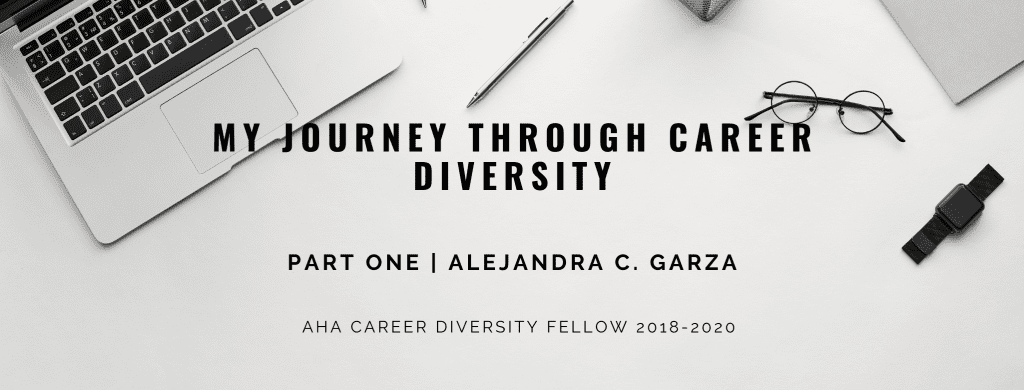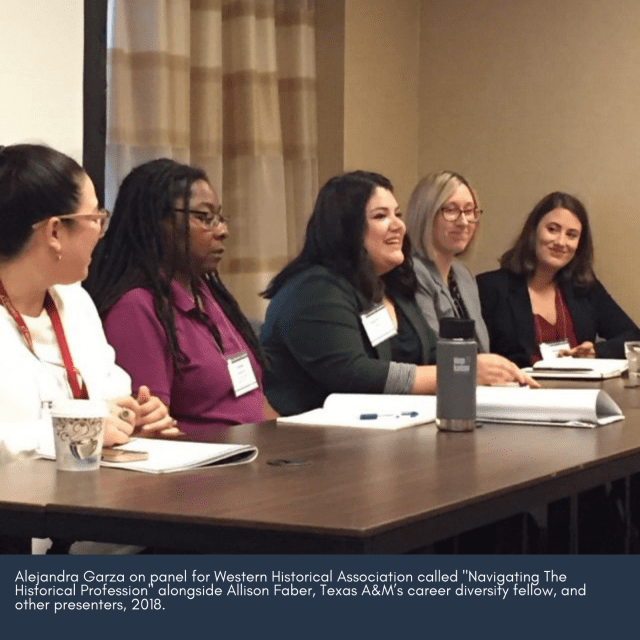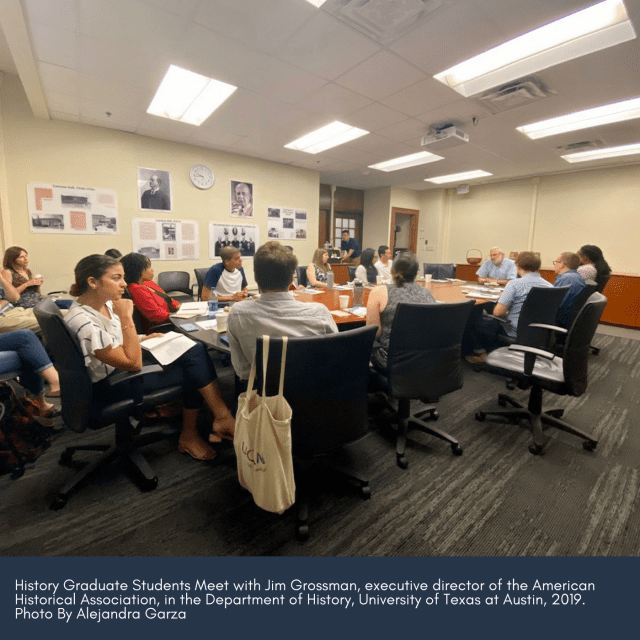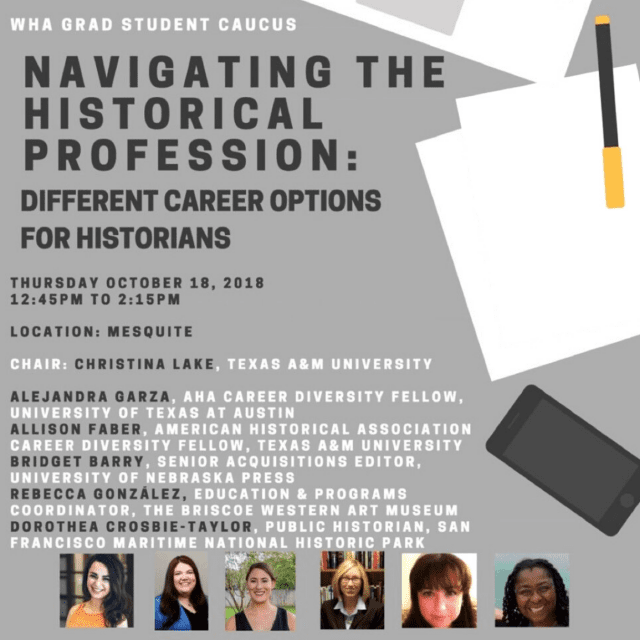
From the Editors: This is the first in a new series, Navigating the PhD and Beyond: Lessons from the AHA Career Diversity Initiative. In this article, Alejandra Garza introduces the Career Diversity for Historians Initiative and her role as a 2018-20 graduate student fellow. Each week on Friday we will feature an interview and connected materials assembled and curated by Alejandra as part of this important initiative.
“I don’t want to be a professor.”
Those seven words are probably not what a typical Ph.D. candidate is supposed to say. But that’s exactly what I announced in 2015 as I considered the University of Texas at Austin as the potential site for my doctoral research. Thankfully, these seven words did not derail my admission. I breathed a sigh of relief when Dr. Alison Frazier, the graduate advisor, opened that Recruitment Weekend with a straightforward but hugely important statement: “We know not everyone wants to be a professor, or will obtain a tenure-track job. That is okay. We believe in the malleable Ph.D. and we will help you build your skill set.”
The idea of the “malleable PhD” became my driving motivation (along with my research) as I completed my graduate school education at UT-Austin. I have not only felt comfortable saying that my career aspirations extended beyond faculty-positions but I also have seen the history department here actively engage with what is so often called “alt-ac.”

Before going any further, I would like to take this opportunity to interrogate the use of that phrase. “Alt-ac” implies that anything PhD holders achieve outside faculty jobs is “alternative” to what they “should” be doing, namely teaching at a university. It automatically creates an “other” category and isolates graduate students who do not aspire to be professors. A far better way to think of things is in terms of “faculty” and “non-faculty” jobs, both of which are outcomes to be aspired to.
A far better way to think of things is in terms of “faculty” and “non-faculty” jobs, both of which are outcomes to be aspired to.
Anthony T. Grafton and James Grossman explained it best in their article “No More Plan B” that appeared in the October 2011 issues of Perspectives. They challenged graduate programs “to change our attitudes and our language, to make clear to students entering programs in history that we are offering them education that we believe in, not just as reproductions of ourselves, but also as contributors to public culture and even the private sector.” It was a cultural reset for graduate programs and kicked off what is now known as the Career Diversity for Historians Initiative run by the American Historical Association (AHA).

In 2013, the Andrew Mellon Foundation awarded the AHA a grant to pursue the Career Diversity Initiative beyond the research phase. In 2016, UT-Austin’s Department of History participated in Faculty Institutes and was one of 20 departments chosen for a Career Diversity Implementation Grant (CDIG) in 2018.
From 2018-2020, I was the student fellow alongside Dr. Frazier, who was the faculty fellow. During that time, I created a student advisory council with representatives from each cohort to ensure that career diversity was openly discussed and embraced within the department. We hosted a range of events that featured alumni, visiting historians, and administrators from across campus. We were also one of the first departments to welcome Annie Maxfield, the Director of Graduate Career & Professional Development at UT-Austin as she expanded the Texas Career Engagement Office.
My goal as a fellow was to create an environment where no student felt like an outsider because of their career aspirations. I would also like to note that Career Diversity was not solely about non-faculty job exploration. As I once told the student advisory council, “We aren’t anti-professor, we are pro-jobs.” The goal was to show graduate students, and frankly professors too, that the skills we develop in this program are applicable no matter what we do when we leave.
The goal was to show graduate students, and frankly professors too, that the skills we develop in this program are applicable no matter what we do when we leave.
For those reasons and many more, I am pleased to introduce a new series for Not Even Past as part of the AHA’s Career Diversity for Historians Initiative at UT-Austin. Called “Navigating the PhD and Beyond”, this series features interviews with alumni who candidly share their experience on the Forty Acres, their journey into the job market and more recently, COVID-19’s effects on their position and daily lives.

My time as Career Diversity Fellow was one of the most important and fulfilling parts of my graduate school journey. I am proud of how far the department and the university have come in the last five years. I am grateful for the guidance of Dr. Frazier, Emily Swafford (Director of Academic and Professional Affairs at AHA), Dylan Ruediger (Coordinator, Career Diversity for Historians and Institutional Research at AHA), and everyone who participated in the workshops, panels, and discussions that I had the pleasure of organizing over the past two years.
I entered the graduate program at the University of Texas at Austin knowing what I didn’t want to do afterward, but I had no idea what I wanted to do. Now, I aspire to work in higher education administration, ideally an office like Texas Career Engagement, where I can help future graduate students see how their grad degree can help them be whatever they want to be. A graduate degree doesn’t limit you in any way, it does the exact opposite. Thanks to the AHA Career Diversity Initiative, I think more and more graduate students and professors are realizing this and I am proud to share these interviews with Not Even Past’s readers.
The views and opinions expressed in this article or video are those of the individual author(s) or presenter(s) and do not necessarily reflect the policy or views of the editors at Not Even Past, the UT Department of History, the University of Texas at Austin, or the UT System Board of Regents. Not Even Past is an online public history magazine rather than a peer-reviewed academic journal. While we make efforts to ensure that factual information in articles was obtained from reliable sources, Not Even Past is not responsible for any errors or omissions.



